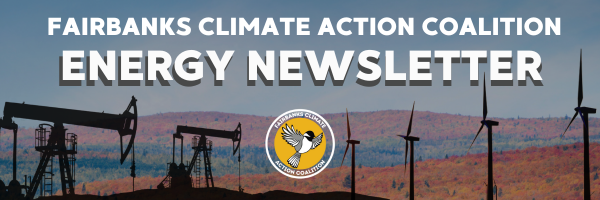FALL ENERGY NEWSLETTER
Hello all, thanks for being here with us as the season changes! This month we have an encouraging article on the effectiveness of solar panels in northern climates, and an article about the economic possibilities and pitfalls when it comes to the end of life of the Trans-Alaska Pipeline System. As we settle into a cozy time of year, please join us in welcoming a new face to the team and if you see something you think we’ve missed, please let us know! Send us an email at connect@fbxclimateaction.org.
It’s (somewhat) common knowledge that solar panels in Fairbanks need to face south and be at a 65 degree tilt to maximize energy production. But, that’s for monofacial panels, ones that only have panels on a single side. New bifacial panels have a different story; they work best when vertical and facing east/west!
This article from UAF (based on this openaccess journal article) has more information.
Special note: If you ever need access to a scientific journal article, but can’t afford to pay for it (most are behind a paywall), email the author! Scientists and engineers are happy (and legally able) to share their articles for free.
A recent article in the Alaska Law Review looks at the future of the Trans Alaska Pipeline System (TAPS), and who might be left on the hook for dismantling and cleaning it up when it reaches the end of its life.
The article, titled “Making Alaskans Whole: How Regulators Can Restore Trans-Alaska Pipeline System Lands and Recover Billions for the Public,” looks at how the decommissioning process for the pipeline could be a massive economic engine, if done right.
However, if regulators fall short, it could leave the state responsible for footing the hefty bill for eventual decommissioning of the pipeline (something that fossil fuel companies have been legally obligated to set aside money to pay for). You can also check out the podcast here, where authors Catherine Rocchi and Phil Wight tell the tale of two futures, each with dramatically different implications for the future prosperity of the state.
TAPS - The Trans Alaska Pipeline System is one of the largest pipeline systems in the world, which transports oil from Alaska's North Slope to Valdez for export by ship. It was commissioned in 1977, and is operated by Alyeska Pipeline Service Company (partnership of multiple oil companies including ConocoPhillips, ExxonMobil, Hilcorp).
RCA - The Regulatory Commission of Alaska is a state-level body that regulates pipelines and public utilities such as electric, water, telecommunication, etc.
DEC - The Alaska Department of Environmental Conservation is a State-level agency that administers laws and regulations for Alaska's natural resources and environment. Per the legislation, its motto is "to conserve, protect and improve [Alaska's] natural resources and environment and control water, land and air pollution in order to enhance the health, safety, and welfare of the people of the state and their overall economic and social well being."
Candidates needed for GVEA district 3
The GVEA board’s District 3 seat is up next year, and we’re looking for people in this district who are interested in running. District 3 includes the Riverview/Westgate area, Dale Rd area, South Fairbanks, most of Chena Pump on the river side, the Van Horn area, and a good portion of Badger Road. Check out the map here. If you know someone in this district who you think might make a good candidate, let us know!
Email lee@fbxclimateaction.org with candidate ideas, or if you want more information on running yourself!
What is a rate case and why is GVEA filing for one this December?
When it comes to determining member rates, our electric utility co-ops have a few options available: Cost of Power Adjustments (COPA), Simplified Rate Filings (SRF), and rate cases. The most extensive of these methods is filing a rate case with the Regulatory Commission of Alaska (RCA).
There are many reasons a utility may file a rate case. The most common one is to raise rates but, among others, they can also file to change customer classes (small business, residential, commercial, etc.) or when financial recovery for a project is needed.
In a rate case, the electric utility presents their reports and a new rate proposal. The RCA then begins their investigation looking for two main things - whether the studies done by the co-op are valid, and if the proposed rates are “just and reasonable.” This investigation can last up to 450 days.
For more information on rate cases, see the explainer from the Alaska Energy Transparency Project at the link below.
Meet Jackson, the dog behind FCAC’s new Energy Justice Organizer, Lee!
"My name is Jackson. I was born on Thanksgiving in 2019 and I like to celebrate each year by going on a hike with just me and Lee, my roommate. I was in the sheriff’s training academy until I was 5 months old, when they decided I was too laid back for their line of work and sent me back to be re-homed. That’s when I met Lee. I did a short stint in search and rescue work with Lee in the Cascades before settling down as a stay-at-home dog.
Now I spend my days hiking, feuding with the local squirrels, or burying the toys I don’t like. My favorite toy is a miniature squeaking pig who I bring to bed with me every night."
If you want to know more about Jackson's roommate Lee, or the work he does with FCAC, you can learn more here.
Become a Member of FCAC! By signing up for membership, you become part of the climate justice movement in creating a sustainable and equitable future for Alaska. As a member, you can join others and contribute to our Coalition projects and campaigns while getting exclusive resources and engaging in opportunities for climate action, community gatherings, organizing training, and leadership development.
Subscribe to keep receiving our energy newsletter! We'll only send the first few of these energy newsletters to everyone. Subscribe if you want to keep receiving our monthly energy newsletter!











